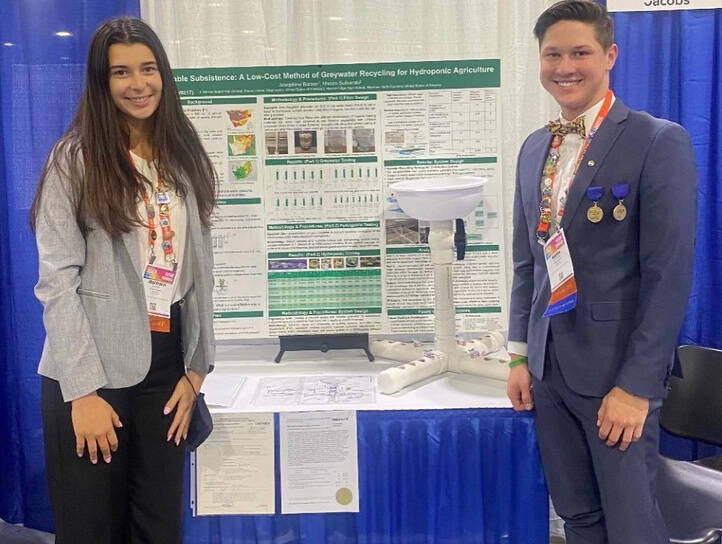Josephine Barber smiles and says she’s glad that she can make a difference in the world by contributing to the steps being taken toward a more sustainable future.
The 16-year-old Mercer Island High School junior who sports a 3.95 grade-point average considers herself a creative person and firmly places science atop her docket of interests. She also enjoys using her critical thinking skills in the engineering and math realms.
Barber and her project partner Mason Sufnarski, a senior at Marvin Ridge High School in Waxhaw, North Carolina, delved into those fields and caught the attention of the U.S. Environmental Protection Agency (EPA) when they designed a low-cost hydroponic solution to recycle greywater for crop growing.
Following a presentation of their joint project to a set of judges at the recent Regeneron International Science and Engineering Fair in Atlanta, Georgia, the duo earned an honorable mention after finishing fourth in the environmental engineering category.
Barber is honored that the EPA showed an interest in their project and conducted an interview with them to make the honorable mention decision. Her eyes lit up when discussing the sustainable subsistence agricultural project coming to fruition and opening some eyes along the way.
“I’m a strong believer in that sustainability is very important and it’s very crucial right now as global warming and climate change all starts to take over the world,” she said. “A lot of people, especially big companies, they don’t really think about climate change, they don’t really think about all the (irreversible) damage that is being done to our world and our planet.”
About 10 months before entering their project into EPA’s national Patrick H. Hurd Sustainability Award competition, Barber and Sufnarski met during an online pre-college summer course offered through Duke University. They began working on the project soon after via Zoom and put the finishing touches on it in February.
“During that course, we both had an interest in solving water resource management issues, and more specifically, South Africa, due to my grandparents living there and both of my parents grew up there, so I’ve experienced these problems first hand when I went to go visit my grandparents,” Barber said.
They shared their designs and results of their experiments online and finally met in person at the fair in May. “It definitely added a lot more to the experience being in person,” Barber said.
According to a press release, their project “sought an equitable solution to help communities deal with lower water availability, which impacts the soil acidity and causes major food shortages.”
Two main parts of the project featured Barber testing hydroponics — defined as growing plants without soil — and the effectiveness of the “Kratky method” by using different solutes and seeing how much each sample would grow under varying solutions; and Sufnarski designing different filters and testing them on rocks and sand to assess their ability to regulate the pH levels of water. The project also included a prototype device made from plumbing parts as their proposed solution to the situation, the release added.
“The International Science and Engineering Fair celebrates the scientific curiosity and achievement of the next generation of scientists, engineers and researchers,” said Maureen Gwinn, principal deputy assistant administrator for EPA’s Office of Research and Development, in the release. “We are proud to recognize these young innovators who are using science to address current and emerging environmental issues; congratulations to all the finalists.”
Through her involvement in the project, Barber learned about global women’s health technology from one of her two Duke mentors during a visit after the fair. It sparked an interest for the Islander and could be part of her future plans.


